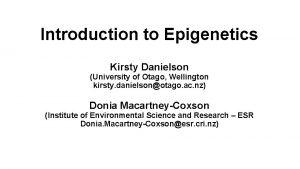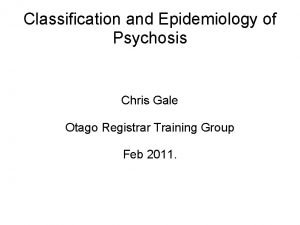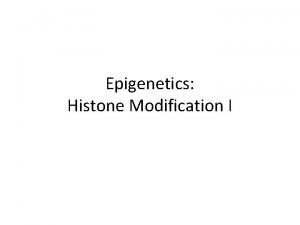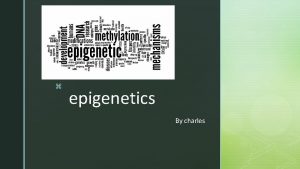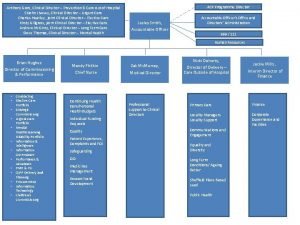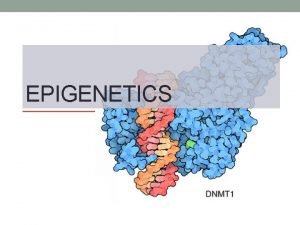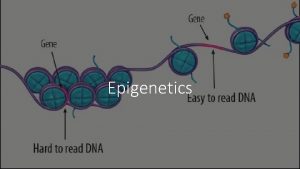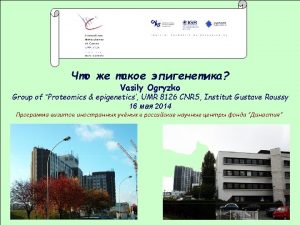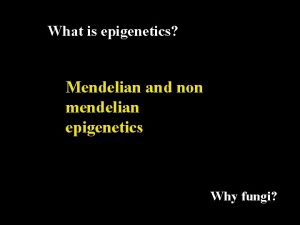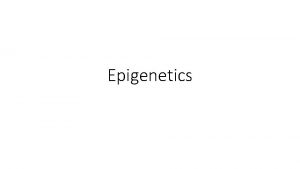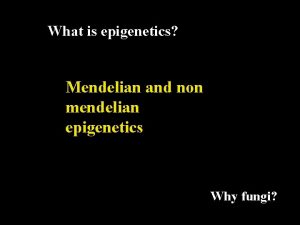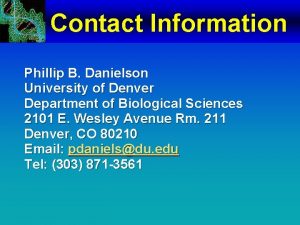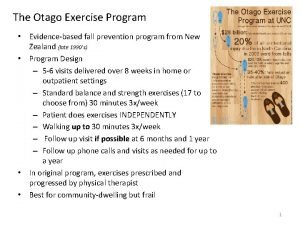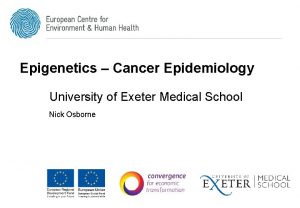Introduction to Epigenetics Kirsty Danielson University of Otago


























- Slides: 26

Introduction to Epigenetics Kirsty Danielson (University of Otago, Wellington kirsty. danielson@otago. ac. nz) Donia Macartney-Coxson (Institute of Environmental Science and Research – ESR Donia. Macartney-Coxson@esr. cri. nz)

If your DNA is the unique ‘song of you’, then epigenetics provides the audio engineers that decide how the music is played

Epigenetics • “epi” means above in greek • DNA about 1. 2 m long in each cell, about 32. 7 trillion (32, 700, 000, 000) cells in your body! • how does it fit in?


Epigenetics wraps up the letters of DNA then what – how can the books be read? Smart wrapping = punctuation = !, underline, strikethrough, highlight, comma


Epigenetics – you’ve seen the effects!


Epigenetics Interprets the letters which chapter of the book is relevant? The same letters (DNA) but very different outcomes!


Epigenetics – where the language of your DNA and your environment meet

Epigenetics – where the language of your DNA and your environment meet

Epigenetics – a role in complex diseases, such as obesity, and type-two diabetes + = Metabolic disease obesity type-two diabetes cardiovascular disease

Developmental Diseases Obesity High Blood Pressure Type-two diabetes Coronary Artery Disease Bipolar Disorder Kidney Function Autism Inflammatory arthritis Cancer

Epigenetics – where the language of your DNA and your environment meet

The Microbiome • Bacteria, fungi, protozoa, and viruses • 10 x more microbial cells than human cells in your body (100, 000, 000 cells) • >10, 000 different microbe species found in the human body so far • 1 -3% total body mass Spor A, Koren O and Ley R. Unravelling the effects of the environment and host genotype on the gut microbiome. Nature Reviews Microbiology. 2011; 9: 279.

If your DNA is the unique ‘song of you’, and epigenetics provides the audio engineers that decide how the music is played, then the microbiome is the crowd interacting with a performance

Debby Laukens, Brigitta M. Brinkman, Jeroen Raes, Martine De Vos, Peter Vandenabeele; Heterogeneity of the gut microbiome in mice: guidelines for optimizing experimental design, FEMS Microbiology Reviews, Volume 40, Issue 1, 1 January 2016, Pages 117– 132,

Genetics and the microbiome • Where is there more genetic diversity between individuals: human genomes or microbiome genomes? • Are there more genes in your own genome or your microbiome genome? Genome e. g. horizontal gene transfer Microbiome Epigenome e. g. DNA methylation differences and bacterial specific transcriptome

Kostic et al. , Gastroenterology. 2014 May; 146(6): 1489 -99. doi: 10. 1053/j. gastro. 2014. 02. 009. Epub 2014 Feb 19.


Balancing bacteria and the shift to disease • Symbiotic and usually not pathogenic (disease causing) • Individuals have >160 species of microbiota in their gut: diversity is good! • Microbiome changes with diet and travel Spor A, Koren O and Ley R. Unravelling the effects of the environment and host genotype on the gut microbiome. Nature Reviews Microbiology. 2011; 9: 279.

Probiotics • Probiotics are live organisms (‘good bacteria’) that can be ingested and colonise the gut to produce health benefits • Animal models show health benefits of probiotics in disorders ranging from peanut allergy to autism spectrum disorder

Antibiotics “…you’re an ecosystem and what you’re doing is like spraying roundup on a grass lawn and then being surprised that broadly weeds take over and you never get the grass back again. ” Professor Alan Cooper

Clostridium difficile • Clostridium difficile is a spore forming bacteria that can cause colonic colitis • Often happens after a course of antibiotics • Faecal transplant to recolonise the gut if it’s severe, 80 -90% cure rate https: //www. sciencenews. org/article/genes-control-toxinproduction-c-difficile-id%E 2%80%99 d

Discussion points – in no specific order! • A record of your life time environmental exposures to date? • A ‘measure’ of cultural, community, family - Ancestry AND culture? • Heritability of epigenetics: controversial, limited/temporary heritability? • Useful as biological markers (biomarkers) in medicine? • A possibly target for treatment?
 Basteria
Basteria Chris gale otago
Chris gale otago Early fly
Early fly What is epigenetics
What is epigenetics Kirsty hunter
Kirsty hunter Kirsty clelland
Kirsty clelland Kirsty bauer
Kirsty bauer Kirsty tonks
Kirsty tonks Kirsty mc
Kirsty mc Kirsty forrest
Kirsty forrest Kirsty gillgrass suicide
Kirsty gillgrass suicide Hazmat for dummies
Hazmat for dummies Danielson framework
Danielson framework Alrik danielson
Alrik danielson Jane horney
Jane horney Karen danielson horney
Karen danielson horney Danielson rubric
Danielson rubric Enhancing professional practice
Enhancing professional practice Egrowing
Egrowing Danielson teacher evaluation scores
Danielson teacher evaluation scores Danielson clusters
Danielson clusters Domain 1: planning and preparation examples
Domain 1: planning and preparation examples Danielson domain 1 evidence examples
Danielson domain 1 evidence examples Teori kepribadian menurut karen horney
Teori kepribadian menurut karen horney Danielson framework summary
Danielson framework summary Marzano walkthrough form
Marzano walkthrough form Danielson and marzano
Danielson and marzano
